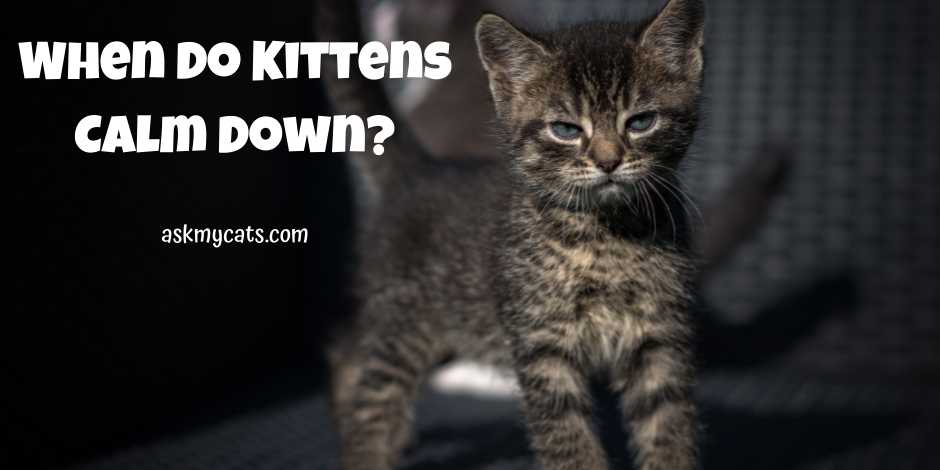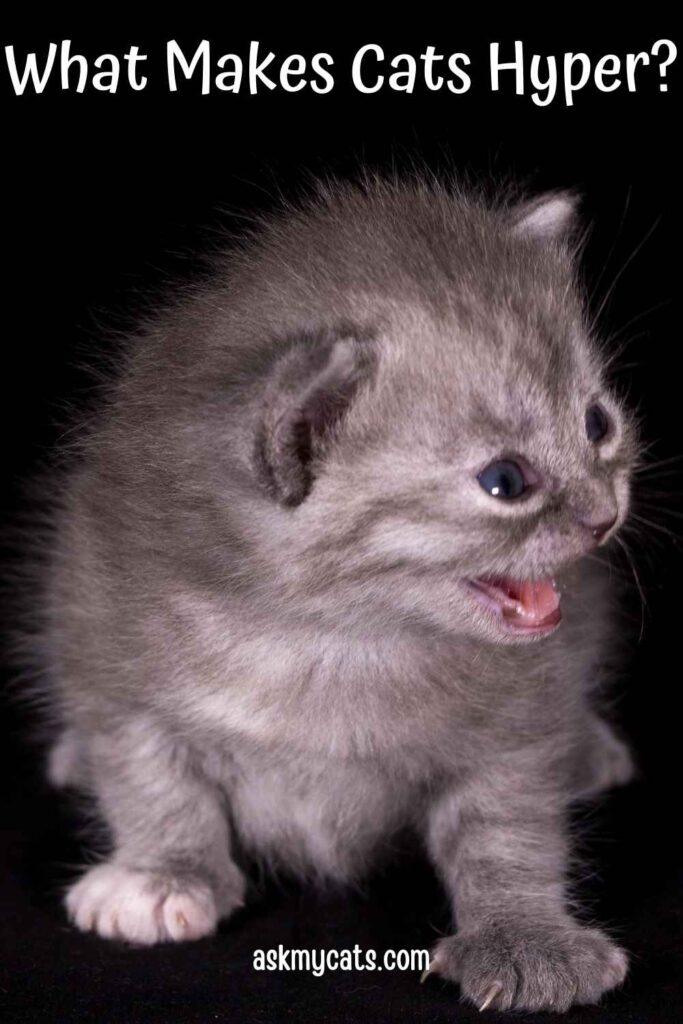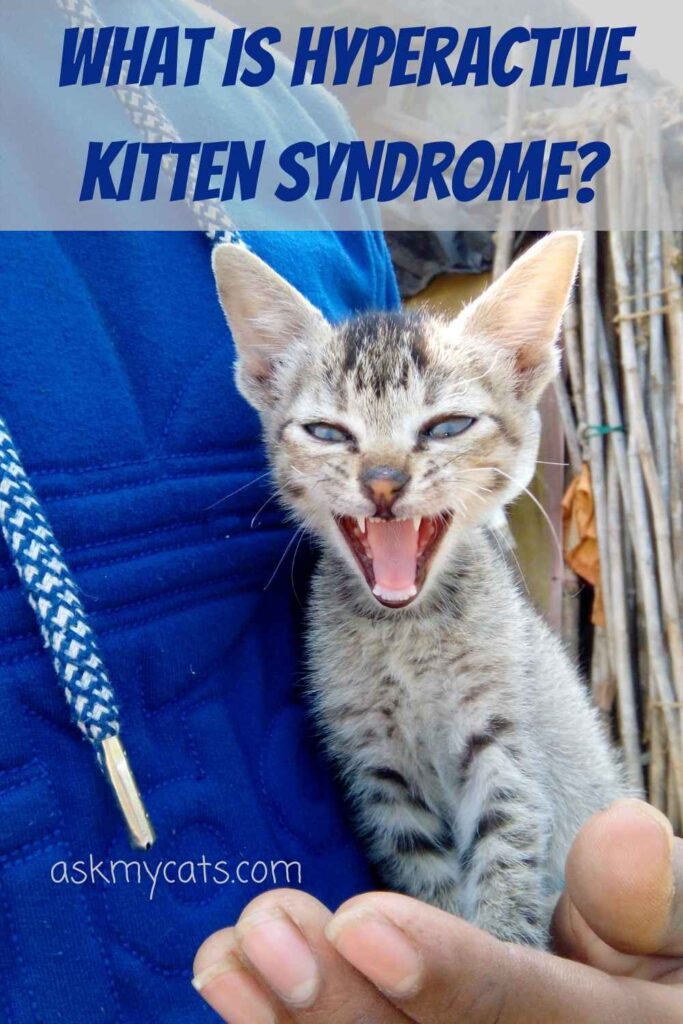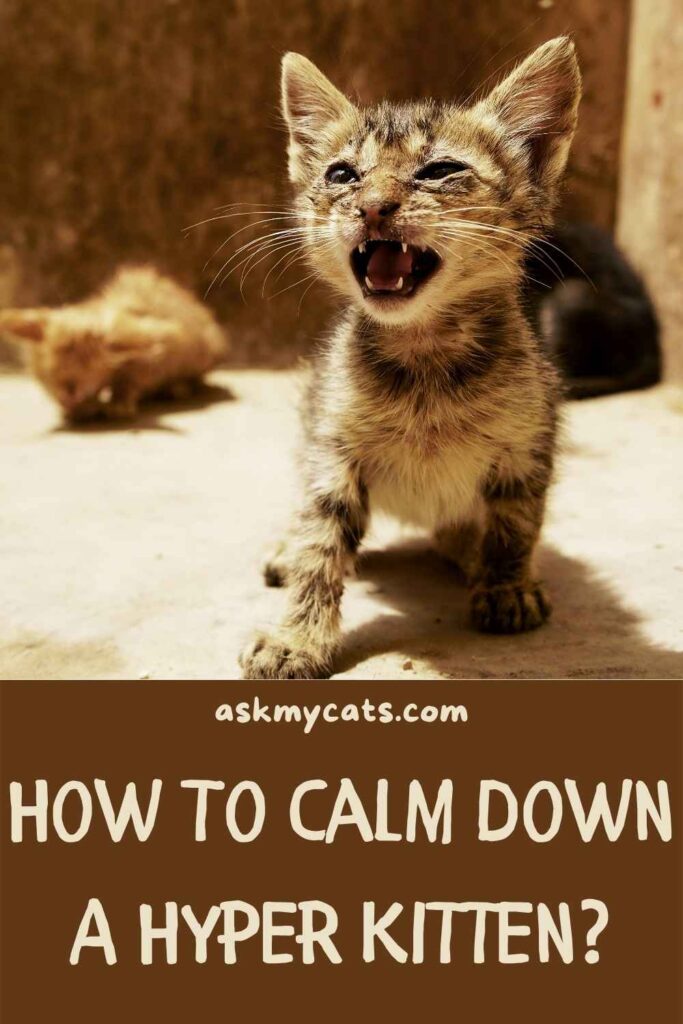Kittens are one of the cutest creatures on the planet. In fact, they’re lovely, lovely, and quite engaging.
But, like many other first-time pet owners, we frequently contemplate one point. When do kids genuinely begin to quiet down and mature?
Kittens often settle down or decrease their excessive activity levels when they are between the ages of eight and twelve months.
Around the 10th week, a kitten begins to show signs of activity, which can last until the first birthday. Other cats, on the other hand, mature before their first year.


Give Your Cat the Perfect Day
Get the Free Ebook!
At What Age Do Kittens Calm Down?
Kittens will begin to settle down around the age of 8-12 months (about the equivalent of 16 in human years) and you will see less and less of this hyperactive behavior.
They begin to get hyperactive at the age of ten weeks, so if you want to avoid the hyperactive stage, consider adopting an older cat or one that is just over a year old.
Around the age of three months, a kitten’s most energetic period begins. From now until they reach adulthood, they will consume a lot of food, run about a lot, and perhaps ruin some furniture and tissue paper rolls.
While some cats will outgrow their hyperactivity, others may continue to be hyperactive until maturity.
Do Cats Get Hyper/Angry?
Cats have a reputation for being cold and heartless. A notion like this couldn’t be further from the truth. Felines go through a wide spectrum of emotions. Anger and frustration are two emotions in this emotional range.
Understanding feline emotional well-being is equally as vital as physical health, according to the Journal of Feline Medicine and Surgery.
An owner must address their cat’s emotional condition if he or she is furious or distressed. Failure to do so may have a negative impact on the human-feline relationship.
How to Tell If A Cat is Hyper/Angry?
It’s difficult to gauge a cat’s mood. There are, thankfully, other methods to learn about a cat’s emotional state. It’s crucial to understand the significance of feline body language and vocalizations.
Just because your cat isn’t reacting to you doesn’t imply it’s angry or annoying.
According to Current Biology, this indicates that you and your cat have a strong affinity. Infuriated cats frequently make their unhappiness known.
Keep an eye out for any of the following features, or a combination of them:
- Standing with a back arched (Halloween cat position)
- Hissing or growling is examples of agitated verbalizations.
- The tail sweeps the ground, and the eyes are wide and looking.
- The cat’s ears lie flat against his head, his jaw is tight, and his fangs are visible.
- The claws have been unsheathed and are ready to use.
You should figure out why your cat is irritated. There are several explanations available. It’s possible that you or someone else is to blame.
In any case, knowing what irritated your cat can help you prevent a recurrence situation in the future.
What Makes Cats Hyper?
You’re not alone if you’ve ever wondered why your cat gets irritated. A variety of apparently benign items can upset cats.
However, there are situations when feline rage may be explained.

1. Sudden Waking
Cats enjoy sleeping. This obsession with napping isn’t just a case of laziness. For felines, simply being awake and roaming about is taxing.
Senior cats, in particular, find exercise to be a great challenge. Rest is necessary for arthritic joints to recuperate from exercise.
If your cat is sleeping soundly, it should not be disturbed. If the cat is in your way or lying on top of anything you need, this situation might be aggravating. A cat will become enraged if you wake it up from a deep slumber before it is ready.
When cats sleep, they feel defenseless. A cat dozing in a public area of a house is a sign of trust and confidence. This trust has been betrayed by waking the cat. The cat will become enraged right away.
2. Unwanted Handling
If you have to handle your cat, do it with caution. Cats prefer to go about with all four paws on the ground and call the shots when it comes to handling. Taking a cat by surprise, especially from behind, will elicit quick rage.
It’s occasionally inevitable to have to handle a cat. For example, you might need to use a flea treatment. This activity should not be sufficient to excite or irritate a cat.
Putting your cat in the bath, on the other hand, is a different story. Expect to have a temporary rift with your cat in this situation.
Petting a cat might sometimes irritate your furry friend. The skin of cats is extremely delicate. While the cat will purr contentedly at first, it may get irritated.
Petting becomes uncomfortable if the skin is overstimulated.
Keep an eye out for signals that your cat has got his or her fill of physical attention. Squirming on your lap, tensing your body, and watching your hands are all examples of body language clues. It’s possible that the purring will come to an end. At the very least, the tone of the conversation will shift.
The cat will become irritated if you disregard these indications. It will appear as if you are not paying attention to and listening to its cues.
Overstimulation will almost certainly result in a scratch or bite from the cat before it moves away. Allowing things to get this far is not a good idea.
Avoid caressing the sensitive underbelly of the cat or contacting the paw pads, since this is the golden rule of cat handling. Because cats are so sensitive, they normally dislike being stroked in these locations.
3. Invasion of Territory
The territory is everything to cats. When a cat establishes a territory for itself, it will zealously maintain it. Invading territory enrages a cat right away. Another pet or its owner might be the infiltrator.
Within a house, every cat should have their own zone. This should ideally be a whole, underutilized room. If this isn’t possible, a community space’s nook will suffice. Consider this land sacrosanct, no matter where it is.
This will be understood by other cats. If you have many cats, they will seldom trespass on each other’s territory. Any uninvited guest will be shooed away swiftly and forcefully.
Humans are not exempt from territorial respect. Cleaning a cat’s habitat is considered aggressive behavior. Removing stuff that a cat has painstakingly gathered will enrage the cat.
What Age Are Kittens Most Hyper?
Up to the age of six months, kittens are seen to be most hyper.
Around the age of three months, the social play reaches its pinnacle. They enter their adolescent years at the age of 4 to 9 months.
They may begin to sense their predatory nature and the desire to “hunt” and scavenge. They may begin to bring toys with them, sleep more during the day, and play more in the evenings.
Why Is My Kitten So Hyper At Night?
Kittens and younger cats are more prone to engage in late-night activities than older cats because they have more energy and a greater desire to play.
This is excellent news because it suggests that, with a little time and patience, the cat will start sleeping more throughout the night as they become older.
Another reason for your cat’s strange behavior might be because some cats are nocturnal, which means they are more active at night.
When the cat’s owner returns home in the evening, the cat is likely to be highly active and eager to play. The cat may act erratically if it doesn’t have a way to release all of its pent-up energy.
What Is Hyperactive Kitten Syndrome?

Feline hyperesthesia syndrome (FHS) is an uncommon reason for a cat to act erratically, affecting mostly older cats and with no recognized cause.
If you see any of the following, talk to your veterinarian about the likelihood of FHS: While your cat is rushing about, the skin on its back looks to be rippling.
Kittens have a lot of energy, are curious, naughty, and are quite active when they are not napping.
If you have a kitten, you’re probably familiar with a number of the hyperactive behaviors described below.
The following are examples of hyperactive behaviors:
- Frantically running around the house
- Pursuing other individuals (people and other pets)
- Jumping over and across furniture
- Licking is a compulsive behavior
- Being outspoken and desirous of attention
Is Cat Hyperactivity Something To Be Concerned About?
There’s no need to be concerned about a hyperactive kitten. Cats are inherently energetic creatures.
However, if you see any behavior that concerns you, you should take your cat to the veterinarian for a check-up.
If you see abrupt behavioral changes or other symptoms, it might be an indication that something else is wrong.
If your kitten hasn’t been to the vet and there aren’t any health problems, plenty of playtime and attention should help them burn off some energy.
How To Calm Down A Hyper Kitten?
Never approach a hyper kitten until it is ready to be approached. You may get clawed or bitten as a result of your annoyance manifesting as aggression.
Find out what’s bothering your cat and give it some space. Provide a peace offering, such as food, after a brief amount of time. Your cat will be distracted from its irritation by a meal or snack. To restore balance, end the cat’s soothing with play.
Experiencing strong emotions, such as wrath, is neither healthy nor beneficial for cats. Cats are happiest when they lead peaceful, conflict-free lives. Avoid any conduct that is likely to trigger feline irritation if you want to preserve a good relationship with your cat.
It might be daunting to deal with a furious cat. Cats may be little, but they have unexpected mood swings. If your cat is displaying signs of mental distress, you must intervene.
An enraged feline should not be overlooked. Turning your back and seeming to be ignorant might make matters worse. If your cat is irritated, it will want you to notice it.
This does not imply that you should approach the cat right away. Your cat is probably not looking for company. Instead, consider the question, “What will calm down my cat?” Through experience, you may learn how to calm a cat’s rage.
Do not be concerned if this is not the case. The four-step procedure mentioned below can be followed. If you handle these situations with care and respect for your cat’s feelings, it will gradually calm down.

1. Provide Space and Solitude
Getting on your cat’s face will not assist whatever is bothering it. Cats as previously said act on instinct. This tendency will be to fight first and ask questions later if offended or threatened. This may be painful since a furious cat’s claws will be unsheathed.
Take a step back from your cat to demonstrate that you are not a threat. Keep your hands visible while speaking gently.
Say something soothing and soothing like, “It’s OK, I’m stepping away.” Allow the cat a clear, visible way to flee without coming into contact with you.
If your cat has a territory, it will most likely go right to this room. For the time being, stay away from this region. The cat needs some alone time to calm down. You’ll start the rage cycle all over again if you make instant contact.
2. Offer Food and Treats
You’ll have to approach the cat after a while. If the cat is left alone for too long, it will get despondent. Stress will result from such an attitude, which will escalate to aggressiveness. It’s a delicate balancing act to know when to approach a cat.
If you feel like you’ve had enough time with your cat, don’t go into it empty-handed. If you have wronged the cat, you should extend an olive branch.
Cats don’t keep grudges against their beloved humans, but they do want something in return.
This is best done with a bite of food or a reward. A cat’s attention is always drawn to food. When given food, the cat will forget what has enraged it and will instead focus on eating. After that, you can think of an approach.
3. Offer Play and Petting
This stage should only be attempted if your cat appears to be open to it. Until your cat requests affection, keep your hands to yourself. You should be able to tell when a cat will accept petting and other forms of interaction by now.
Offer tickles and scratches on the cat’s preferred body areas if it nuzzles against you. Usually, the area behind the ears and beneath the chin is secure.
If the cat purrs comfortably, you’re almost done with the relaxing procedure. Just make sure you stop caressing the cat before it becomes overstimulated.
Offer to play at the end of this petting session. Bring a cat’s favorite toy and propose some playtime. A game is the last stage in ensuring that everything is in order.
Frequently Asked Questions
Why do kittens run around like crazy?
A cat that doesn’t get enough exercise during the day may act erratically… When the cat’s owner returns home in the evening, the cat is likely to be highly active and eager to play. The cat may act erratically if it doesn’t have a way to release all of its pent-up energy. Kittens are quite active.
Is a calm kitten normal?
Kittens with a low level of activity are peaceful and safe. While they do play and engage with their littermates, you’ll note that they aren’t generally the ones that start fights. These kittens have the best of both environments and will grow up to be peaceful, loving cats.
Do kittens calm down after being neutered?
The temperament, training, and personality of a cat are mostly determined by heredity and upbringing and are unaffected by male hormones. Castration is unlikely to bring a hyperactive cat to a halt or reduce hostility toward humans.
Final Words
Cats are naturally one of the most inquisitive species on the planet. As a result, it’s not uncommon to find a hyperactive feline running, climbing, and leaping all over the furniture.
The most essential thing is to keep your cat entertained; a bored cat is prone to mischief, and keeping them quiet would be difficult.
Just keep things simple, and having a companion at home (whether it’s another cat or an older dog) will always help!
Share your thoughts in the comments section below!
Interesting Read: Why Is My Pregnant Cat Hyperactive And Restless?

Nice article.
Thank You.
Happy Cat Parenting